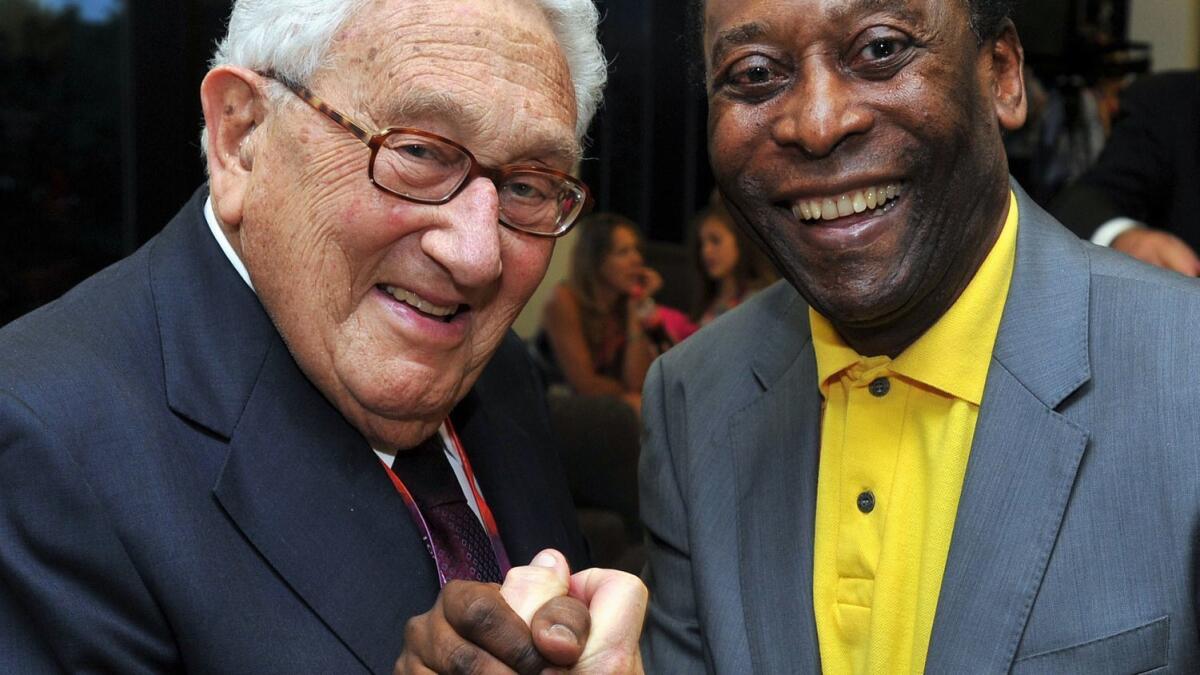Henry Kissinger: For a more peaceful vision of the future, look to the Olympics

- Share via
Humanity has never lived under a single unified world order. When it has been maintained at all, order has been achieved only within the shifting bounds of limited regions, and even then there have been inevitable tensions and clashes.
But one bright spot in global relations has endured for more than a century: the Olympic Games. Under the auspices of the Games, the nations of the world come together despite the differences in culture and history that define their diverse systems. In the peaceful competition of the Olympics, the achievement of one nation encourages the efforts of others, spurring all to new heights in human excellence.
When Baron Pierre de Coubertin, a French educator and historian, revived the ancient Olympic tradition in 1894, his political world was dominated by suspicion. The map of Europe had been redrawn and psychological adjustments to the change were still underway. Imperial ambitions were causing dislocation and conflict around the world, and stability on the continent, though attained for the time being, felt — and was — impermanent. But De Coubertin managed to transcend this historical moment with a vision of amity and trust, inspired by a ritual originating from ancient Greece, a place and time still more turbulent than his own.
That animating spirit of international confidence has proved capable of withstanding periods of social division, political exhaustion, and total upheaval. This year, we celebrate the 125th anniversary of the International Olympic Committee and the 25th anniversary of the first United Nations’ Olympic Truce, an international resolution of armistice that reiterates our common commitment to the Games’ original purpose: “peace through sport.”
Each iteration of the Games over the years has had its own significance, informed by the challenges and the triumphs of the contemporary moment.
I have now lived through 46 Olympic Games, many of which I have had the privilege of attending in person. I have shared the pleasure with my children and grandchildren. Each iteration of the Games over the years has had its own significance, informed by the challenges and the triumphs of the contemporary moment.
Throughout its history, the Olympics has demonstrated its ability to promote human understanding even where political agreement has proved elusive. There have been many instances in which the Games exercised this capacity, perhaps the most extraordinary of which were the eight years from 1956 to 1964, in which East and West Germans competed as a single team even as the Cold War reached its climax and the world was brought to the brink of nuclear war.
The Games have also served as a showcase of global progress toward De Coubertin’s initial aim of comity between peoples. The opening ceremony of the 1992 Games was one such occasion. On the stadium floor in Barcelona that July night, newly independent nations of Central Europe made their proud Olympic debut. The Germans again entered under one flag. South Africa, emerging from the darkness of apartheid, returned to the Games after a three-decade absence.
The most recent example was the joint march of the teams of the two Koreas at the opening ceremony of the Winter Games in 2018.
At times, the Olympics have been marred by violence, from the murder of Israeli athletes to the transformation, post-Olympics, of Sarajevo’s venues into killing fields during the Bosnian War. But the world’s checkered history does not preclude its improvement, nor does it detract from the inherent value of the Olympic spirit.
Enter the Fray: First takes on the news of the minute »
The Olympic Games offer a glimpse of a wider truth: The presence of competition does not necessitate the advent of conflict. The Games demonstrate our shared capacity to make commonality, and not difference, and, in so doing, opens the possibility of compartmentalizing our national and regional interests, contending with each other in one area while collaborating in another.
Of course, the Games alone cannot prevent wars or end conflicts. But, by providing a framework in which competition and cooperation coexist, the Olympics may be taken as inspiration in an international search for understanding through and alongside contestation.
The countries of the world are today inextricably linked. They will continue to affect each other and, in some places, compete. Some see this as a challenge but the Olympic Games can be a valuable symbol of how to compete in a peaceful way.
In my view, the Games present a lens in which to look beyond this moment in history and focus on building bonds that enhance mutual understanding, promote peace, and drive our shared pursuit of the many forms of human greatness.
Henry Kissinger, an honour member of the International Olympic Committee, is a former U.S. secretary of State.
More to Read
A cure for the common opinion
Get thought-provoking perspectives with our weekly newsletter.
You may occasionally receive promotional content from the Los Angeles Times.









